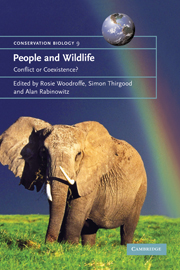Book contents
- Frontmatter
- Contents
- List of contributors
- Foreword
- Acknowledgements
- 1 The impact of human–wildlife conflict on natural systems
- 2 The impact of human–wildlife conflict on human lives and livelihoods
- 3 Characterization and prevention of attacks on humans
- 4 Non-lethal techniques for reducing depredation
- 5 Techniques to reduce crop loss: human and technical dimensions in Africa
- 6 Evaluating lethal control in the management of human–wildlife conflict
- 7 Bearing the costs of human–wildlife conflict: the challenges of compensation schemes
- 8 Increasing the value of wildlife through non-consumptive use? Deconstructing the myths of ecotourism and community-based tourism in the tropics
- 9 Does extractive use provide opportunities to offset conflicts between people and wildlife?
- 10 Zoning as a means of mitigating conflicts with large carnivores: principles and reality
- 11 From conflict to coexistence: a case study of geese and agriculture in Scotland
- 12 Hen harriers and red grouse: the ecology of a conflict
- 13 Understanding and resolving the black-tailed prairie dog conservation challenge
- 14 People and elephants in the Shimba Hills, Kenya
- 15 Safari hunting and conservation on communal land in southern Africa
- 16 Socio-ecological factors shaping local support for wildlife: crop-raiding by elephants and other wildlife in Africa
- 17 Jaguars and livestock: living with the world's third largest cat
- 18 People and predators in Laikipia District, Kenya
- 19 Searching for the coexistence recipe: a case study of conflicts between people and tigers in the Russian Far East
- 20 A tale of two countries: large carnivore depredation and compensation schemes in Sweden and Norway
- 21 Managing wolf–human conflict in the northwestern United States
- 22 Policies for reducing human–wildlife conflict: a Kenya case study
- 23 An ecology-based policy framework for human–tiger coexistence in India
- 24 The future of coexistence: resolving human–wildlife conflicts in a changing world
- References
- Index
23 - An ecology-based policy framework for human–tiger coexistence in India
Published online by Cambridge University Press: 23 November 2009
- Frontmatter
- Contents
- List of contributors
- Foreword
- Acknowledgements
- 1 The impact of human–wildlife conflict on natural systems
- 2 The impact of human–wildlife conflict on human lives and livelihoods
- 3 Characterization and prevention of attacks on humans
- 4 Non-lethal techniques for reducing depredation
- 5 Techniques to reduce crop loss: human and technical dimensions in Africa
- 6 Evaluating lethal control in the management of human–wildlife conflict
- 7 Bearing the costs of human–wildlife conflict: the challenges of compensation schemes
- 8 Increasing the value of wildlife through non-consumptive use? Deconstructing the myths of ecotourism and community-based tourism in the tropics
- 9 Does extractive use provide opportunities to offset conflicts between people and wildlife?
- 10 Zoning as a means of mitigating conflicts with large carnivores: principles and reality
- 11 From conflict to coexistence: a case study of geese and agriculture in Scotland
- 12 Hen harriers and red grouse: the ecology of a conflict
- 13 Understanding and resolving the black-tailed prairie dog conservation challenge
- 14 People and elephants in the Shimba Hills, Kenya
- 15 Safari hunting and conservation on communal land in southern Africa
- 16 Socio-ecological factors shaping local support for wildlife: crop-raiding by elephants and other wildlife in Africa
- 17 Jaguars and livestock: living with the world's third largest cat
- 18 People and predators in Laikipia District, Kenya
- 19 Searching for the coexistence recipe: a case study of conflicts between people and tigers in the Russian Far East
- 20 A tale of two countries: large carnivore depredation and compensation schemes in Sweden and Norway
- 21 Managing wolf–human conflict in the northwestern United States
- 22 Policies for reducing human–wildlife conflict: a Kenya case study
- 23 An ecology-based policy framework for human–tiger coexistence in India
- 24 The future of coexistence: resolving human–wildlife conflicts in a changing world
- References
- Index
Summary
INTRODUCTION
Carnivores are in decline across the world for a variety of reasons, among which conflict with humans is the most predominant (Woodroffe 2000). This conflict takes varied forms and involves several carnivore species (see Treves and Karanth (2003) for a recent review). Mitigation of such conflicts should be the most important part of any conservation agenda that strives for continued coexistence of carnivores and humans. Among carnivore taxa, felids in the genus Panthera appear to be particularly conflict-prone (Rabinowitz 1986; McDougal 1987; Mishra et al. 2003; Ogada et al. 2003). How conservationists can promote the coexistence of Panthera cats and humans in densely populated countries such as India, or can generate potentially useful models for other regions of the world where human population densities and habitat fragmentation levels are relatively lower, but rising rapidly, are urgent problems.
The tiger (Panthera tigris) is a felid species of global concern because of its cultural and ecological significance (Jackson 1990; Karanth 2001; Thapar 2002). Over the last three decades, the Indian government has used the tiger as an effective flagship species to protect a wide range of biodiversity. Special tiger reserves have been established in different biomes across India covering mangrove swamps, alluvial grasslands and forests of the deciduous, semi-deciduous and evergreen types. However, India's wild tiger populations are still under serious threat from human impacts such as prey depletion, poaching, habitat loss and fragmentation (Karanth and Stith 1999; Seidensticker et al. 1999; Karanth 2003).
- Type
- Chapter
- Information
- People and Wildlife, Conflict or Co-existence? , pp. 373 - 387Publisher: Cambridge University PressPrint publication year: 2005
- 41
- Cited by

